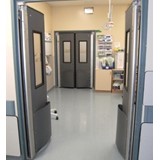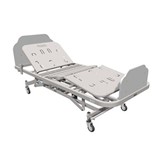AMA President Dr Michael Gannon said the nation's public hospitals are under severe pressure to meet growing demand for their services, and Labor's plan to restore the National Health Reform Agreement and provide an additional $2 billion for public hospital funding over four years would help relieve some of the strain on the system.
"Public hospitals have never been busier. The ageing population and health problems like obesity, diabetes and other complex and chronic illnesses are seeing more and more patients turning up to hospitals in need of care," Dr Gannon said.
"Government funding is not keeping pace, forcing hospitals to do more with less, exacerbating problems like crowded emergency departments and long waiting lists for elective surgery.
"Labor's commitment to provide an extra $2 billion over four years is a welcome short-term boost. It will help take a lot of the pressure off hospital emergency departments and reduce waiting times for treatment.
"But what the public hospital system really needs is a guarantee of adequate funding over the long-term.
"The AMA will continue to work with both the major parties to get agreement on adequate, long-term and sustainable public hospital funding."
Earlier this year, Prime Minister Malcolm Turnbull reached agreement with the States and Territories to provide an additional $2.9 billion for public hospitals over the next four years, but the Commonwealth will provide 45 per cent, rather than 50 per cent, of growth funding, and it will be capped at 6.5 per cent.
Labor says it will provide an extra $2 billion on top of this and increase the Commonwealth's share of growth funding to 50 per cent.
The AMA's recent Public Hospital Report Card shows that recent cuts to hospital funding are affecting services. It found that improvements in hospital performance have stagnated and, in some instances, have begun to fall back.
Almost a third of Emergency Department patients categorised as urgent are waiting more than 30 minutes for treatment, and elective surgery patients are, on average, waiting six days longer than they were a decade ago.
Dr Gannon said the results were a wake-up call to both sides of politics that much more needed to be done to put public hospital funding on a sustainable footing.
"Patients are paying the price for a mounting shortfall in funding. As a nation, we must do better," he said.
In addition to an increased in public hospital funding, Labor announced a $100 million, two-year plan to trial a new model of care it calls Your Family Doctor, which is similar to the Coalition Government's $21 million trial of its Health Care Homes initiative.
Dr Gannon said the focus on the central role of general practice and the increased commitment was welcome, but the details of what was being proposed were limited.
"The AMA has said that the $21 million the Coalition has allocated for the Health Care Homes trial is inadequate," he said.
"Greater support for primary health care is vital. General practice is the cornerstone of the health system – and it is also the most efficient part of the health system, and investing in primary care should be a top priority," Dr Gannon said.
Earlier in the campaign, Labor pledged to reinstate Medicare rebate indexation from next year, and Dr Gannon challenged the Coalition to match Labor's commitment.
"The rebate freeze is unfair and it is wrong," Dr Gannon said.
"We know that it is pushing many practices to breaking point. Some are being forced to introduce patient charges for the first time, others are having to increase their fees. Either way, patients lose out and health suffers.
"Whatever happens at the 2 July poll, the freeze of Medicare rebates must end."

.jpg)












